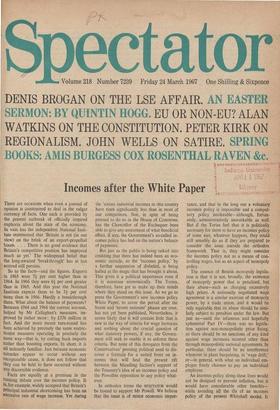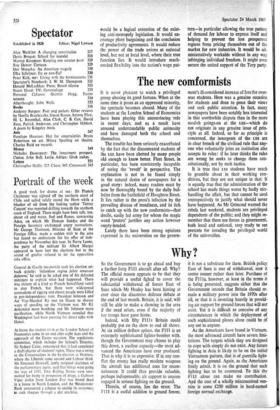Incomes after the White Paper
There are occasions when even a journal of opinion is constrained to deal in the vulgar currency of facts. One such is provided by the present outbreak of officially inspired euphoria about the state of the economy. In vain has the independent National Insti- tute cojnmented that `Britain is not (in our view) on the brink of an export-propelled boom. . . . There is no good evidence that Britain's competitive position has improved much as yet.' The widespread belief that the long-awaited 'breakthrough' has at last arrived still persists.
So to the facts—and the figures. Exports in 1965 were 71 per cent higher than in 1964. In 1966 they were 61 per cent greater than in 1965. And this year the National Institute expects them to be 51 per cent more than in 1966. Hardly a breakthrotigh there. What about the balance of payments? Between 1964 and 1966 the current account, helped by Mr Callaghan's measures, im- proved by rather more: by £376 million in fact. And- the more recent turn-round has been achieved by precisely the same restric- tionist measures operating in precisely the same way—that is, by cutting back imports rather than boosting exports. In short, it is all tediously familiar. Just because economic miracles appear to occur without any recognisable cause, it does not follow that they can be held to have occurred without any discernible evidence. the 'sixties industrial incomes in this country have risen significantly less than in most of our competitors. Nor, in spite of being pressed to do so in the House of Commons, has the Chancellor of the Exchequer been able to give any assessment of what beneficial effect, if any, the Government's so-called in- comes policy has had on the nation's balance of payments.
But just as the public is being talked into crediting that there has indeed been an eco- nomic miracle, so the 'incomes policy,' by a further suspension of disbelief, is being hailed as the magic that has brought it about. This gives it a political importance even if it is nonsense economically. The Tories, therefore, have got to make up their minds where they stand on this issue. As we go to press the Government's new incomes policy White Paper, to cover the period after the freeze and 'severe restraint' phases are over, has not yet been published, Nevertheless, it seems likely that it will contain little that is new in the way of criteria for wage increases and nothing about the crucial question of what statutory powers. if any, the Govern- ment will seek to enable it to enforce these criteria. But none of this derogates from the Conservatives' pressing political need to dis- cover a formula for a united front on in- comes that will heal the present rift between the Maudling faction's support of the Treasury's idea of an incomes policy and the Powellite opposition to any policy what- ever. sory policy intolerable—although, fortun- ately, administratively unworkable as well. But if the Tories feel that it is politically necessary for them to have an incomes policy of some sort, whatever happens, they could still sensibly do so if they are prepared to consider the issue outside the orthodox framework. That is, they might consider the incomes policy not as a means of con- trolling wages, but as an aspect of monopoly policy. would be a logical extension of the exist- ing anti-monopoly legislation. It would en- courage plant bargaining and the conclusion of productivity agreements. It would reduce the power of the trade unions at national level, but not at local level, where their true function lies. It would introduce much- needed flexibility into the nation's wage pat- tern—in particular allowing the true pattern of demand for labour to express itself and helping to prevent the less prosperous regions from pricing themselves out of the market for new industries. It would be ad- ministratively workable without in any way infringing individual freedom. It might even secure the united support of the Tory party.



































